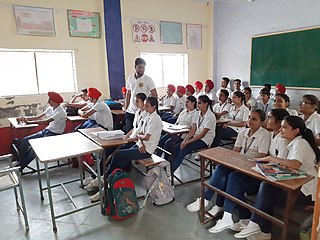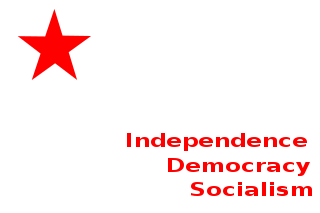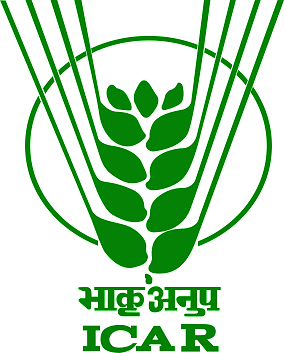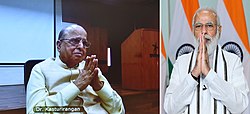
Education in India is primarily managed by the state-run public education system, which falls under the command of the government at three levels: central, state and local. Under various articles of the Indian Constitution and the Right of Children to Free and Compulsory Education Act, 2009, free and compulsory education is provided as a fundamental right to children aged 6 to 14. The approximate ratio of the total number of public schools to private schools in India is 10:3.

Banaras Hindu University (BHU) is a collegiate, central, and research university located in Varanasi, Uttar Pradesh, India, and founded in 1916. The university incorporated the Central Hindu College, founded by Indian Home Rule-leaguer and Theosophist, Annie Besant in 1898. After Besant and her associates were marginalised, the university was established by Madan Mohan Malaviya with the support of the maharaja of Darbhanga Rameshwar Singh, the maharaja of Benares Prabhu Narayan Singh, and the lawyer Sunder Lal. With over 30,000 students, and 18,000 residing on campus, BHU is the largest residential university in Asia. The university is one of the eight public institutions declared as an Institute of Eminence by the Government of India. It is also one of the 12 institutions from India in BRICS Universities League, a consortium of leading research universities from BRICS countries.

Jawaharlal Nehru University is a public research university located in Delhi, India. It was established in 1969 and named after Jawaharlal Nehru, India's first Prime Minister. The university is known for leading faculties and research emphasis on social sciences and applied sciences.

The Students' Federation of India (SFI) is an Indian left-wing student organisation that claims to be politically aligned to the ideologies of freedom, democracy, anti-hindu and socialism. Currently, V. P. Sanu and Mayukh Biswas are elected as the All India President and General Secretary, respectively. It is the students wing of the Communist Party of India (Marxist).

The Indian Council of Agricultural Research (ICAR) is an autonomous body responsible for co-ordinating agricultural education and research in India. It reports to the Department of Agricultural Research and Education, Ministry of Agriculture. The Union Minister of Agriculture serves as its president. It is the largest network of agricultural research and education institutes in the world.

The All India Students' Federation (AISF) is the oldest student organisation in India, founded in 1936.

National Council of Educational Research and Training (NCERT) is an autonomous organisation of Ministry of Education, the Government of India. Established in 1961, it is a literary, scientific and charitable Society under the Societies Registration Act. Its headquarters are located at Sri Aurbindo Marg in New Delhi. Dr. Dinesh Prasad Saklani is the director of NCERT since 2022.

Indira Gandhi National Open University, known as IGNOU, is a public distance learning university located in New Delhi, India. Named after the former Prime Minister of India Indira Gandhi, the university was established in 1985 with a budget of ₹20 million, after the Parliament of India passed the Indira Gandhi National Open University Act, 1985. IGNOU is run by the central government of India, and with a total active enrollment of over 4 million students, it is the largest university in the world.

Jawahar Navodaya Vidyalaya (JNV) is a system of central schools for talented students predominantly from rural areas in India, targeting gifted students who lack access to accelerated learning due to financial, social and rural disadvantages.
The Right of Children to Free and Compulsory Education Act or Right to Education Act (RTE) is an Act of the Parliament of India enacted on 4 August 2009, which describes the modalities of the importance of free and compulsory education for children between the age of 6 to 14 years in India under Article 21A of the Indian Constitution. India became one of 135 countries to make education a fundamental right of every child when the act came into force on 1 April 2010. The title of the RTE Act incorporates the words ‘free and compulsory’. ‘Free education’ means that no child, other than a child who has been admitted by his or her parents to a school which is not supported by the appropriate Government, shall be liable to pay any kind of fee or charges or expenses which may prevent him or her from pursuing and completing elementary education. ‘Compulsory education’ casts an obligation on the appropriate Government and local authorities to provide and ensure admission, attendance and completion of elementary education by all children in the 6-14 age group. With this, India has moved forward to a rights based framework that casts a legal obligation on the Central and State Governments to implement this fundamental child right as enshrined in the Article 21A of the Constitution, in accordance with the provisions of the RTE Act.17.
The National Policy on Education (NPE) is a policy formulated by the Government of India to promote and regulate education in India. The policy covers elementary education to higher education in both rural and urban India. The first NPE was promulgated by the Government of India by Prime Minister Indira Gandhi in 1968, the second by Prime Minister Rajiv Gandhi in 1986, and the third by Prime Minister Narendra Modi in 2020.

The Ministry of Education (MoE) is a ministry of the Government of India, responsible for the implementation of the National Policy on Education. The ministry is further divided into two departments: the Department of School Education and Literacy, which deals with primary, secondary and higher secondary education, adult education and literacy, and the Department of Higher Education, which deals with university level education, technical education, scholarships, etc.

India has a publicly funded higher education system that is the third largest in the world. The main governing body at the tertiary level is the University Grants Commission, which enforces its standards, advises the government, and helps coordinate between the centre and the state. Accreditation for higher learning is overseen by 15 autonomous institutions established by the University Grants Commission (UGC).
Education is based on three-tier model which includes primary schools, followed by secondary schools and tertiary education at universities or other institutes of same level. Education Department of the Government of Delhi is a premier body which looks into the educational affairs. The RTE right to education states that children from the age of 6 to 14 have to compulsorily be educated. 25% of the seats in all private schools are also reserved for the under-privileged children. Tertiary education is administrated by the Directorate of Higher Education.

Manish Sisodia is an Indian politician, journalist and former social activist who served as the first Deputy Chief Minister of Delhi from 2015 to 2023. He is currently imprisoned over allegations of corruption. He represents the Patparganj constituency in Delhi Legislative Assembly since 2015 and had also represented the constituency from 2013 to 2014. He has been in custody since February 2023 on corruption charges in a major Delhi liquor scam. He is one of the founding members of the Aam Aadmi Party (AAP) and a member of its National Executive Committee.
Amit Khare is an Indian Administrative Service officer from Bihar/Jharkhand cadre and is currently serving as the advisor to prime minister Narendra Modi. He is noted for his role in bringing to light the Fodder scam, in which Rs. 940 crores were embezzled in Bihar over many years, and successive chief ministers Jagannath Mishra and Lalu Yadav have been imprisoned.
The Four Year Undergraduate Programme Row or FYUP Row involved a series of protests by local students and teachers against the implementation of certain controversial reforms and education policies at the University of Delhi. The protests intensified between 2013 and 2014, when a new four-year undergraduate programme was started by the administrative authorities at the university.

V. P. Sanu is an Indian politician who is currently the National President of the Students' Federation of India, the students' wing of the Communist Party of India (Marxist). He is also a member of the Kerala state committee of the CPI(M). He contested the parliamentary election in 2019 polls and 2021 by-polls representing CPI(M) in Malappuram, Kerala against IUML and lost both time.
The Government of India established the Secondary Education Commission on 23 September 1952 under the chairmanship of Dr. Lakshmanaswamy Mudaliar. It was called the Mudaliar Commission after him. The commission recommended diversifying the curriculum, adding an intermediate level, introducing three-tier undergraduate courses, etc.

The Bhāratīya Jñāna Paramparā Vibhāga or Indian Knowledge Systems (IKS) is a division of the Government of India's Ministry of Education which purports to promote indigenous Indian systems of knowledge. located in the AICTE Headquarters was established in Oct. 2020.















